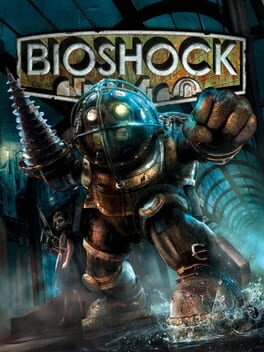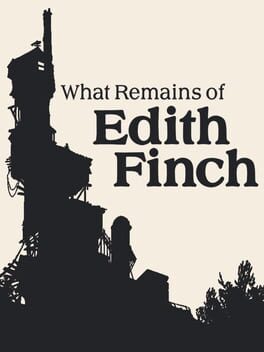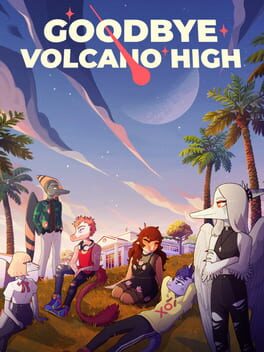BrunoV
Bio
Trying this out
Trying this out
Badges

Noticed
Gained 3+ followers

Roadtrip
Voted for at least 3 features on the roadmap

Liked
Gained 10+ total review likes
Favorite Games
098
Total Games Played
002
Played in 2024
000
Games Backloggd
Recently Played See More
Recently Reviewed See More
Persona 3 Reload is an absolute success in terms of being a remake. It probably helps that the original game was apparently already excellent, and that two pretty much perfect sequels set the stage for how this series plays in the modern day, but still, it doesn’t demerit the fact that this remake is just a blast to play through and the best way to experience Persona 3 yet.
Everything I love about the Persona series is here, from the jazzy earworm-y tunes to the absolutely mind-boggling interface design, characters to watch grow and evolve, ever-increasing stakes, and a delightful combat experience.
The game overall has an ever-present dissonance with regards to the content and the gameplay experience, which don’t fully mesh. It feels like the content from Persona 3 was just inserted wholesale, warts and all, into the framework of Persona 5. The combat is on that level, the visuals are on that level, the voice acting is on that level, same with quality-of-life updates and several little details that weren’t present, or just worked differently on the original Persona 3, and were improved upon on the sequels. What I refer to as “content” here is the overall story, the pace, the structure, the social links, and the characters, which very much feel from an era before the polish and improvements that Persona 4 and 5 brough upon the original Persona 3 formula.
The overall narrative is very engaging, thematically compelling, and bold, but feels disjointed and the pacing is just all over the place. It has a real slow start, and long stretches of nothing going on. Though it ends up sticking the landing with a beautifully melancholic ending, I can easily see how plenty of people would simply drop the game way before reaching a compelling twist or plot point.
These long stretches of nothing going on in the major narrative are supposed to be filled with activities, social links, events, and combat. In terms of things to do there’s way less here than it the sequels, and once the players stats are maxed out, most of those are basically useless ways to get the game to progress. Events are also lacking, there are less opportunities to do activities with side characters, and so, less opportunities to interact with them and get to know them.
Social Links suffer from this “wholesale insert” approach the most next to the overall story, as Persona 3 clearly was the first time that this time was exploring this concept, and got much better at it in the later games. Characters are very fun and compelling, they each have their own little arcs and evolutions they go through in the company of the protagonist, but each episode is extremely short and minor, and end up having no integration with the main narrative nor any real crossover whatsoever. Once Social Links are completed, these characters may as well be dead, there’s no incentive to interact with them, nor any real opportunity to do so. Sadly, the same thing happens with the romance opportunities, there’s no effect on the narrative, no mention of them outside their respective Social Links, and not even consequences if the player pursues multiple romantic partners like happens on the latter games.
Social Events are a very welcome addition that serve to fix one of the major issues of the original Persona 3, the main side characters having no Social Links at all, and it’s an approach that I would have liked to see applied to the overall game a lot more.
The combat itself is outstanding, and pretty much an exact copy of Persona 5, which I don’t mind at all. Tartarus is the issue. While yes, there are some side objectives to complete, exploring Tartarus gets monotonous and dull pretty damn quick. There could have been way less floors with bigger, more compelling layouts, and more enemies to fight in each of them, maybe even making them a bit more visually distinct could have helped in this regard.
I’m glad I finally played Persona 3, I had a great time with it and remembered why I love the series so damn much. I wish the dev team took a lot more inspiration from Persona 5 and dared to make more profound changes to the original, still, as it stands, it’s a spectacular RPG experience that has little to envy from the newer entries in the series.
I can see why this game is beloved now, it has all the charm and style of the latter Persona’s, with a very 2006 edginess and melancholia that makes it very endearing.
Everything I love about the Persona series is here, from the jazzy earworm-y tunes to the absolutely mind-boggling interface design, characters to watch grow and evolve, ever-increasing stakes, and a delightful combat experience.
The game overall has an ever-present dissonance with regards to the content and the gameplay experience, which don’t fully mesh. It feels like the content from Persona 3 was just inserted wholesale, warts and all, into the framework of Persona 5. The combat is on that level, the visuals are on that level, the voice acting is on that level, same with quality-of-life updates and several little details that weren’t present, or just worked differently on the original Persona 3, and were improved upon on the sequels. What I refer to as “content” here is the overall story, the pace, the structure, the social links, and the characters, which very much feel from an era before the polish and improvements that Persona 4 and 5 brough upon the original Persona 3 formula.
The overall narrative is very engaging, thematically compelling, and bold, but feels disjointed and the pacing is just all over the place. It has a real slow start, and long stretches of nothing going on. Though it ends up sticking the landing with a beautifully melancholic ending, I can easily see how plenty of people would simply drop the game way before reaching a compelling twist or plot point.
These long stretches of nothing going on in the major narrative are supposed to be filled with activities, social links, events, and combat. In terms of things to do there’s way less here than it the sequels, and once the players stats are maxed out, most of those are basically useless ways to get the game to progress. Events are also lacking, there are less opportunities to do activities with side characters, and so, less opportunities to interact with them and get to know them.
Social Links suffer from this “wholesale insert” approach the most next to the overall story, as Persona 3 clearly was the first time that this time was exploring this concept, and got much better at it in the later games. Characters are very fun and compelling, they each have their own little arcs and evolutions they go through in the company of the protagonist, but each episode is extremely short and minor, and end up having no integration with the main narrative nor any real crossover whatsoever. Once Social Links are completed, these characters may as well be dead, there’s no incentive to interact with them, nor any real opportunity to do so. Sadly, the same thing happens with the romance opportunities, there’s no effect on the narrative, no mention of them outside their respective Social Links, and not even consequences if the player pursues multiple romantic partners like happens on the latter games.
Social Events are a very welcome addition that serve to fix one of the major issues of the original Persona 3, the main side characters having no Social Links at all, and it’s an approach that I would have liked to see applied to the overall game a lot more.
The combat itself is outstanding, and pretty much an exact copy of Persona 5, which I don’t mind at all. Tartarus is the issue. While yes, there are some side objectives to complete, exploring Tartarus gets monotonous and dull pretty damn quick. There could have been way less floors with bigger, more compelling layouts, and more enemies to fight in each of them, maybe even making them a bit more visually distinct could have helped in this regard.
I’m glad I finally played Persona 3, I had a great time with it and remembered why I love the series so damn much. I wish the dev team took a lot more inspiration from Persona 5 and dared to make more profound changes to the original, still, as it stands, it’s a spectacular RPG experience that has little to envy from the newer entries in the series.
I can see why this game is beloved now, it has all the charm and style of the latter Persona’s, with a very 2006 edginess and melancholia that makes it very endearing.
A terrific way to start the year. A wonderful experience overall. I haven’t played many visual novels, but the ones I’ve played weren’t fully animated and voiced like this one is. I’m pretty sure that this isn’t common at all in the genre, and I believe it’s worth trying out for that reason alone. In terms of its presentation, it’s more an interactive animated show rather than a traditional visual novel.
I found the story and characters to be wonderfully written. It really nails the very online sense of humor, but it’s never snarky nor mean. It’s a very heartfelt story, and even though nostalgia, growing up and the end of the world are key themes it’s never a bummer nor does it lean on despair.
In terms of its gameplay, the few rhythm sections are solid and fun to play through, and the decision making feels consequential enough to be consistently engaging.
The soundtrack is on another level altogether. Banger after banger of original soft indie rock songs accompanied by some beautiful background music. The album is already on my Spotify rotation.
I don’t really have much to say about it, it’s a short, very wholesome, very unique, experience that I’m happy to have played through.
I found the story and characters to be wonderfully written. It really nails the very online sense of humor, but it’s never snarky nor mean. It’s a very heartfelt story, and even though nostalgia, growing up and the end of the world are key themes it’s never a bummer nor does it lean on despair.
In terms of its gameplay, the few rhythm sections are solid and fun to play through, and the decision making feels consequential enough to be consistently engaging.
The soundtrack is on another level altogether. Banger after banger of original soft indie rock songs accompanied by some beautiful background music. The album is already on my Spotify rotation.
I don’t really have much to say about it, it’s a short, very wholesome, very unique, experience that I’m happy to have played through.
This one is right up there with Baldur’s Gate 3 for the top spot of the year. This is easily Remedy’s best game, and their most ambitious one yet, which is saying a lot considering their near perfect, endlessly fascinating, track record. Alan Wake 2 is also, next to Immortality, the most Lynchian game I’ve ever played. There are very clear influences from Twin Peaks the Return, Inland Empire and Lost Highway. It’s a game that purely operates on dream logic and embraces the impossible, something that I very much love to see in a medium where pretty much anything can be done and where games on this scale tend to stick to the overly familiar. All of this is just to state that I loved this game and that it’s pretty much tailor-made for my tastes and interests in art. I’m looking forward to playing the new game plus mode that was recently added, once the DLCs drop and some time has passed.
On a technical level this might very well be the new photoreal graphics ceiling in the medium of videogames. It looks consistently amazing and stylized in just the right places, and it runs pretty much flawlessly on PC. It also achieves some really impressive stuff in regards to changing up the look and layout of levels instantly and the usage of interactable diegetic menus.
The overall story is amazing. Remedy really aimed high here and nailed it. It mixes all of the stuff they’ve toyed with before into an endlessly surprising and engaging experience. It leans heavily into horror, and it succeeds in being a genuinely disturbing game. There are a couple of set pieces that really stand out in terms of quality and novelty, but I believe that it manages to maintain a pretty solid line of excellence all throughout the game. And as expected, awesome original music and impactful sound design. I also absolutely adore the cross referencing of their own games, even when they don't have the rights to them, genius level stuff at play here.
I’m not fully sold on the “free switching between campaigns” concept yet. It’s a cool idea on paper to allow players that freedom, but at the end of the day it doesn’t really matter all that much, and it will probably have an impact on the overall pacing of the game for some players. In my case, I didn’t have that issue, as I switched back and forth every couple of chapters, but I can see players going through an entire campaign before switching back and having a weird, unbalanced, experience by the end. I like pacing to be a bit more authored in these cases.
Pacing does suffer a bit if you decide to engage with the collectibles as I did. The game tends to lose momentum if you decide to run back to previously explored areas to check out newly available spots for collectibles and loot. Moving around is quite a slow process and it shows when retreading places that aren’t all that big really. Luckily, puzzles are mostly fun and well implemented, and most collectibles have actual weight, as they are necessary for character and weapon upgrades or just have some fun story tidbits.
The survival horror genre is also present in its approach to combat, which is probably the weakest part of the game. Somehow the Alan Wake games are the only Remedy games where the combat isn’t a standout element. I think the issues here are how the characters control and how the combat encounters are set up in relation to said control of the player character. Alan and Saga are both quite slow to react to players’ input, and animations for everything take a while, which on its own adds to the overall tension of the combat encounters. Shooting feels good, but aiming is not precise and I found it hard to line up at times.
The way the character controls and resources are spread out feels like the game should be approached like an early Resident Evil or Silent Hill game, where most combat should be avoided when possible. The issue is that enemies here tend to swarm the player and approach quite fast. Differently than in Alan Wake 1, dodging is weightier, slower, and harder to time right, which means that when encountering groups of enemies that will run at the player you’ll have a really hard time trying not to die. I ended up overcoming plenty of these encounters by just remembering the order in which enemies would show up to kill me and nuking them before, which kinda kills the pacing of those encounters and sections too.
The traditional survival horror approach to combat isn’t all that feasible neither, as enemies catch up to the player quickly and tend to follow for a long time. Even if you manage to find a safe spot they’ll still be there when you come out.
I died plenty while playing in normal difficulty and checkpoints are pretty spaced out. Another slight issue that affects the pace of the overall experience.
Still, it’s pretty much a perfect game that I loved from beginning to end. I couldn’t be more curious about whatever Remedy is making next.
I think it would be fascinating to see Sam Lake play Max Payne in the new remakes like he played Alex Casey here, it would be such a full circle moment. Remedy, please keep making weird shit just for me.
On a technical level this might very well be the new photoreal graphics ceiling in the medium of videogames. It looks consistently amazing and stylized in just the right places, and it runs pretty much flawlessly on PC. It also achieves some really impressive stuff in regards to changing up the look and layout of levels instantly and the usage of interactable diegetic menus.
The overall story is amazing. Remedy really aimed high here and nailed it. It mixes all of the stuff they’ve toyed with before into an endlessly surprising and engaging experience. It leans heavily into horror, and it succeeds in being a genuinely disturbing game. There are a couple of set pieces that really stand out in terms of quality and novelty, but I believe that it manages to maintain a pretty solid line of excellence all throughout the game. And as expected, awesome original music and impactful sound design. I also absolutely adore the cross referencing of their own games, even when they don't have the rights to them, genius level stuff at play here.
I’m not fully sold on the “free switching between campaigns” concept yet. It’s a cool idea on paper to allow players that freedom, but at the end of the day it doesn’t really matter all that much, and it will probably have an impact on the overall pacing of the game for some players. In my case, I didn’t have that issue, as I switched back and forth every couple of chapters, but I can see players going through an entire campaign before switching back and having a weird, unbalanced, experience by the end. I like pacing to be a bit more authored in these cases.
Pacing does suffer a bit if you decide to engage with the collectibles as I did. The game tends to lose momentum if you decide to run back to previously explored areas to check out newly available spots for collectibles and loot. Moving around is quite a slow process and it shows when retreading places that aren’t all that big really. Luckily, puzzles are mostly fun and well implemented, and most collectibles have actual weight, as they are necessary for character and weapon upgrades or just have some fun story tidbits.
The survival horror genre is also present in its approach to combat, which is probably the weakest part of the game. Somehow the Alan Wake games are the only Remedy games where the combat isn’t a standout element. I think the issues here are how the characters control and how the combat encounters are set up in relation to said control of the player character. Alan and Saga are both quite slow to react to players’ input, and animations for everything take a while, which on its own adds to the overall tension of the combat encounters. Shooting feels good, but aiming is not precise and I found it hard to line up at times.
The way the character controls and resources are spread out feels like the game should be approached like an early Resident Evil or Silent Hill game, where most combat should be avoided when possible. The issue is that enemies here tend to swarm the player and approach quite fast. Differently than in Alan Wake 1, dodging is weightier, slower, and harder to time right, which means that when encountering groups of enemies that will run at the player you’ll have a really hard time trying not to die. I ended up overcoming plenty of these encounters by just remembering the order in which enemies would show up to kill me and nuking them before, which kinda kills the pacing of those encounters and sections too.
The traditional survival horror approach to combat isn’t all that feasible neither, as enemies catch up to the player quickly and tend to follow for a long time. Even if you manage to find a safe spot they’ll still be there when you come out.
I died plenty while playing in normal difficulty and checkpoints are pretty spaced out. Another slight issue that affects the pace of the overall experience.
Still, it’s pretty much a perfect game that I loved from beginning to end. I couldn’t be more curious about whatever Remedy is making next.
I think it would be fascinating to see Sam Lake play Max Payne in the new remakes like he played Alex Casey here, it would be such a full circle moment. Remedy, please keep making weird shit just for me.







